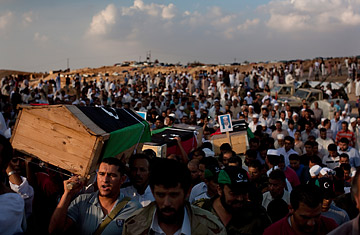
Men carry bodies found in a mass grave to a cemetery overlooking the Libyan town of al-Qala on Sept. 30, 2011
Three children crowd around the parked car, thrusting their little heads through the open window on the driver's side. "Do you love Gaddafi?" they demand to know from a foreign reporter. When the question is turned around, they nod vigorously. "Yes," they all say. Then, with an almost intimidating seriousness: "What are you doing here?"
Unlike their neighbors in nearby communities, the residents of al-Asaaba are not happy with the way things in Libya are going. It used to be the favored town of the area; now its residents are the losers. The kids are an important indicator of this twist of fate. They are Ahmed Ramadan's grandchildren. They went up to the car when it pulled up onto Ramadan's driveway. Ramadan was Colonel Muammar Gaddafi's personal secretary. According to other security chiefs captured by former rebels who now control the country, he was also responsible for relaying the Libyan leader's most important security commands throughout the country during the bloody six-month uprising.
When Ramadan was captured in late August, Tripoli rebel fighters say he tried to kill himself. He survived the self-inflicted gunshot wound to the head only to wind up a prisoner at the rebels' main military base in Tripoli instead. "The rats took him," one of his grandchildren now says from the car window. And around these parts, the children aren't the only ones still using the ousted Libyan leader's slurs for his enemies.
Ramadan's hometown of al-Asaaba is one of several towns on the fringe of western Libya's Nafusa Mountains that two months after the fall of Tripoli have found themselves on the wrong side of history, struggling to survive in a post-Gaddafi period of unmanaged retribution and vigilante comeuppance. "Most of the people who worked for Gaddafi's forces were from Mashashiya, Gawaleesh and al-Asaaba," says Colonel Suleiman Shenbar, a military commander from the transitional government in the regional capital of Gharyan, enumerating nearby towns that were loyal to the fallen regime. "Between 70% and 80% supported Gaddafi," he says of the people of those towns. But, he adds, they have been subdued. Still, submission there came grudgingly. On Sept. 10, loyalists killed eight Gharyani forces when they entered the town to seize weapons, and Shenbar says they're still working on seizing the rest.
In the center of al-Asaaba, the tricolor flag of Free Libya is now painted on some of the storefronts, but it's unclear who put it there. The fighters from Gharyan who man the checkpoints on the town's approach are suspicious of anyone arriving from within al-Asaaba — and perhaps for good reason. "We were the only mountain town that was with Gaddafi," says Hussein Masbah, one of Ramadan's neighbors.
Although most Libyans opposed Gaddafi, the former rebels say, there are still those who benefited from his 42-year rule. Those who hated him — from the political Islamists of Benghazi in Libya's east to the indigenous Amazigh fighters of the Nafusa Mountains in Libya's west — said they did so because of his cruel repression, his cronyism and his neglect of most communities. Those who loved him did so not because he represented a certain politics but because he favored them with jobs or development, the rebels say. The readjustment of fortunes may be hard to digest.
In al-Asaaba, residents speak of their nostalgia for Ramadan and his favors. "This house is not like what you'd imagine," says Hussein Masbah, unlocking the green gate to the former Gaddafi aide's compound. "It's a simple house. He took a bank loan to build this house," he says. Ramadan would spend summers there, doting on the locals, he adds. "We loved him like our father. He always gave money to help poor people." When Gharyani fighters raided the compound a few weeks ago, they caused severe damage, Masbah says, shooting up the walls and arresting several who were guarding the compound, including Masbah's brother, whom he hasn't heard from since.
